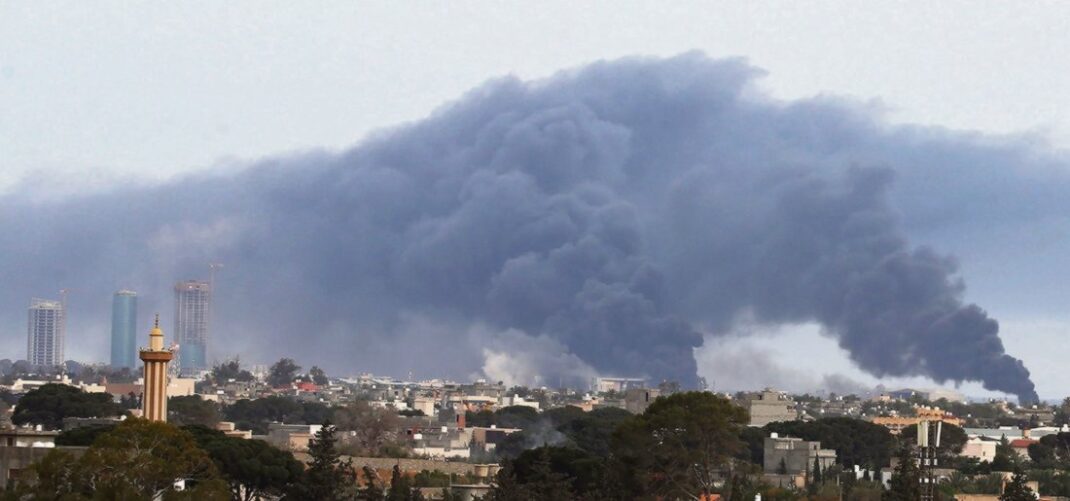Jonathan Fenton-Harvey
 While Libya’s democratic transition is making promising steps, the future of warlord Khalifa Haftar remains an obstacle to Libya’s stability.
While Libya’s democratic transition is making promising steps, the future of warlord Khalifa Haftar remains an obstacle to Libya’s stability.
While he has lost international and domestic support, and has failed in his political ambitions, he may still be unwilling to go down without a fight.
Though Haftar has failed to achieve his political goals, he is still a prominent actor in eastern Libya and could jeopardize the country’s stability going forward.
Two years have passed since Libyan warlord and commander of the self-proclaimed Libyan National Army (LNA), Khalifa Haftar, launched his now-failed offensive on the capital, Tripoli, in April 2019.
Backed heavily by Emirati warplanes and Egyptian weapons, while aided by Russian mercenaries and given diplomatic support by France, Haftar became a force to be reckoned with. He and his backers wanted to impose military rule in Libya and disrupt the country’s democratic transition.
However, his ambitions were thwarted, largely due to Turkey’s military intervention, which started in January 2020 to shore up the internationally recognized Government of National Accord (GNA) and forced the warlord to retreat from western Libya in June that year.
Following that major blow, the UN-backed ceasefire and peace talks last autumn, which entailed holding elections in 2021, further side-lined Haftar and sealed his fate.
The formation of the Government of National Unity (GNU), led by Mohamed al-Menfi as chairman of the Presidential Council and businessman Abdul Hamid Dbeibeh as Prime Minister, took place in Sirte on March 10.
Dbeibah is now the frontrunner ahead of the Egypt and France-favored Aguilah Saleh, who was the speaker of Libya’s previous eastern parliament and previously tipped to be “Haftar’s replacement.”
Even the UAE, which was Haftar’s staunchest backer, has shown receptivity towards Dbeibah and the new political process. On April 7, Abu Dhabi’s Crown Prince Mohammad bin Zayed met with the interim Prime Minister in the Emirati capital. Bin Zayed “renewed his support for the new executive authority in Libya and their endeavors to establish peace and stability,” according to the Emirati news agency WAM.
As the UAE had sour relations with the GNA, and was a leading external player in the conflict, this represents a substantial shift in Abu Dhabi’s policy. The UAE has moved its focus away from Haftar, in line with its less openly bellicose actions elsewhere in the Middle East and North Africa region, while taking a more diplomatic stance towards Libya.
Along with losing key external support, Haftar has now also been forced to accept his rival Turkey’s presence and growing influence in western Libya. Along with losing key external support, Haftar has now also been forced to accept his rival Turkey’s presence and growing influence in western Libya.
Though Haftar previously adopted warlike rhetoric against Ankara, such as threatening to drive out Turkish troops from the country last December, on March 17 he said that he would tolerate Turkish-flagged commercial ships docking in the LNA-controlled city of Benghazi.
“We have no objection to the entry to our ports of Turkish-flagged commercial ships that comply with the stated legal procedures and legislation,”Al-Hadath, a pro-Haftar television station, quoted him as saying. This indicates a clear shift in Haftar’s stance.
To make matters worse for Haftar, his authority over the LNA’s eastern territories is waning. Two rival militias loyal to him clashed in Sirte on April 15, revealing friction within the LNA’s wide array of forces.
Prior to that, a commander of Haftar’s militia in Benghazi, Mahmoud al-Werfalli, was shot dead in his car by unidentified gunmen on March 24.
Furthermore, after over a dozen dead bodies were found in Benghazi, Dbeibah announced on March 18 that he would launch an investigation which could indicate further pressure on Haftar should his forces be held responsible.
Dbeibah’s statement also signals potential tensions with Haftar, and such disagreements could trigger more friction between them should Haftar react harshly.
Though Haftar failed to achieve his political goals and may face internal threats, he is still a prominent actor in eastern Libya for now and could jeopardize the country’s prospects of unity in the near future.
He may also be unwilling to disarm his forces. Indeed, the past influx of Russian and Emirati-hired mercenaries to bolster his forces creates further obstacles for peace.
Lately, reports of violations in his territory have emerged, including a wave of kidnappings in the last few months. The Libyan Crime Watch (LCW) reported in late March that forces loyal to Haftar kidnapped a man and his entire family.
Yet despite enduring such great setbacks, Haftar still seeks to assert his authority in the country. The LNA leader announced that three cities with full facilities will be built east, west, and south of Benghazi, to accommodate at least 12 million people, largely for the families of martyrs in the latest war, Middle East Monitor cited him as saying at a forum on April 12.
Titled the “Dignity Project,” Haftar signed a map outlining the initiative, which aims to provide 10,000 houses for 40,000 people, according to a statement issued by the Libyan Arab Armed Forces Command.
Haftar may further try to leverage the upcoming elections, through backing figures who are close to him. Haftar may further try to leverage the upcoming elections, through backing figures who are close to him. There is some speculation over external support for this objective.
The American website the Washington Free Beacon said that Haftar’s son Saddam met with Israeli intelligence officials in March to discuss his 2021 presidential candidacy, citing an unnamed source.
Saddam Haftar, who wants to run as a proxy for his father, discussed “the situation in the region” and “his aspiration for [the] stability of his country,” with the Israeli officials, and his professed support for “democracy in his country, law and order,” the source stated.
The report added that this comes as Israel may pursue relations with Libya, having already normalized relations with the UAE, Bahrain, Sudan, and Morocco last year. This could be viable as Israel has reportedly provided Haftar with weapons in the past via the UAE.
Some of Haftar’s allies may also try to obtain positions in the government such as in the defense and finance ministries, and Haftar would likely back this as a form of securing influence in any future administration, argued journalist Samer Al-Atrush.
Ultimately, it remains to be seen how much Haftar can claw his way back into Libyan politics. Though the warlord’s career is in retreat, due to a loss of international backing and a tarnished domestic reputation, Haftar is still determined to salvage as much power as possible. This may upset the political transition and keep Libya divided, while he remains an influential actor in the eastern region of the country.
***
Jonathan Fenton-Harvey is a journalist and researcher focusing on conflict and geopolitics in the Middle East and North Africa region. He has particularly covered Gulf issues and Western foreign policy in the region, having delivered numerous talks and articles on these topics. He has been published in Carnegie Endowment, Middle East Eye, the New Arab, TRT World and many others.
____________





